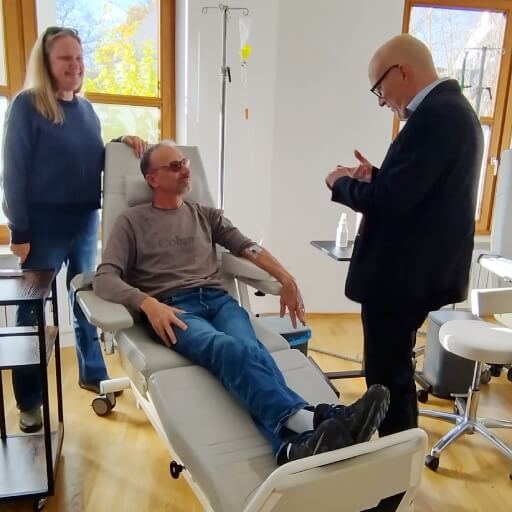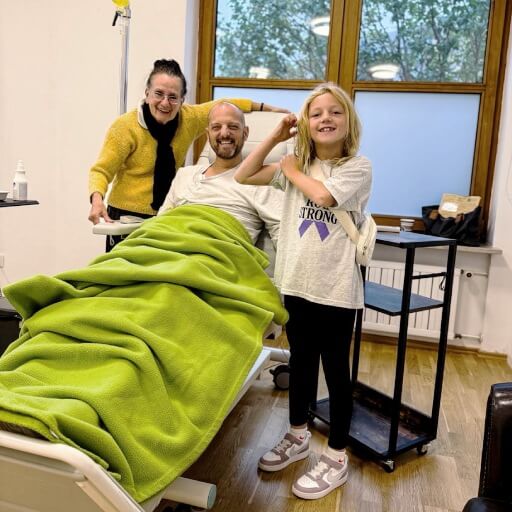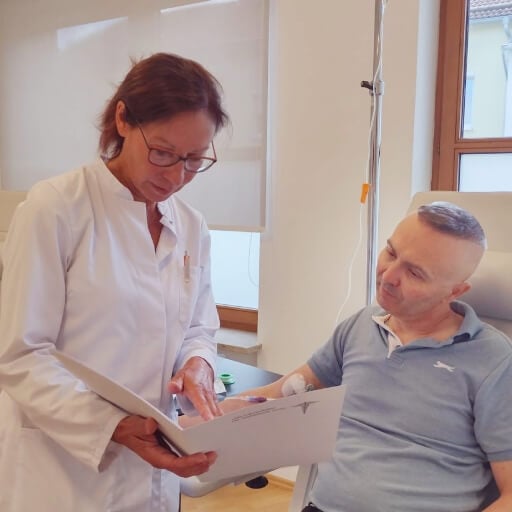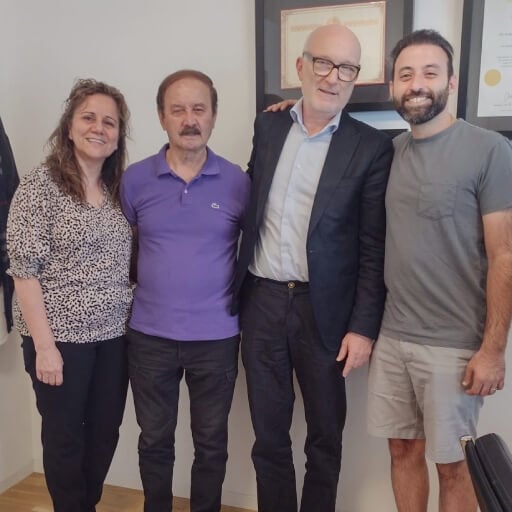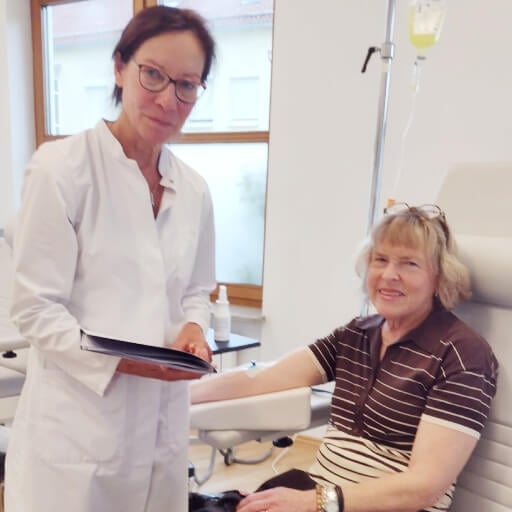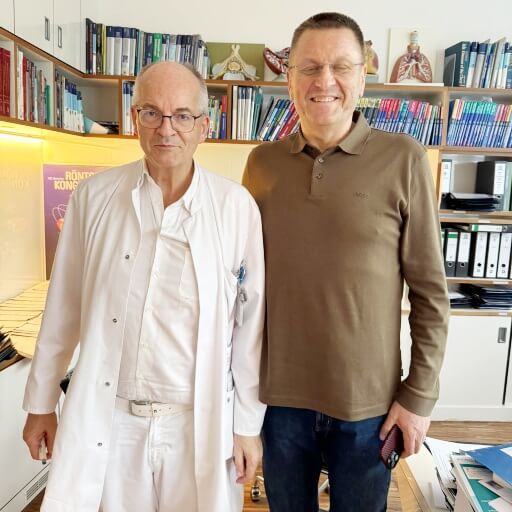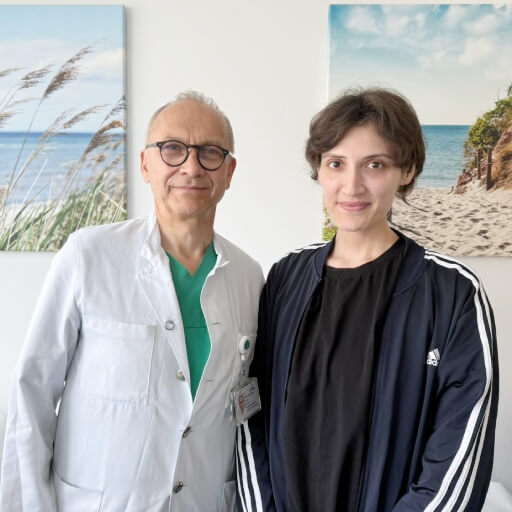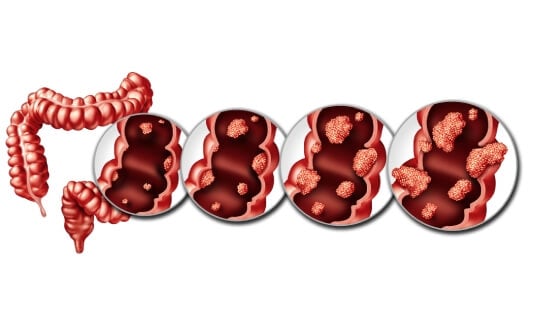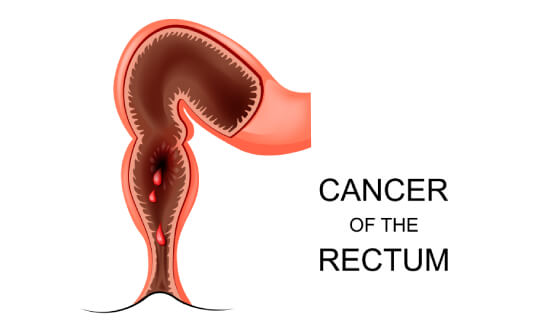Stage IV rectal cancer is the latest and most aggressive form of colorectal cancer. At this stage malignant cells spread beyond the rectum and into other organs (most often to the liver, lungs and lymph nodes). Early screening allows doctors to detect the disease in its early stages 一 but in many cases the diagnosis is made too late due to the absence of pronounced symptoms or missed preventive examinations [1]. When stage IV is detected the tumor usually already has distant metastases.
According to international medical statistics the prognosis for stage IV rectal cancer remains difficult. The average five-year survival rate is approximately 12–14% 一 it depends on the patient's general condition, the location of the metastases and the sensitivity of the tumor to treatment [2].
Despite this modern oncology is developing rapidly and even such a difficult diagnosis today does not mean there is no chance. Thanks to immunotherapy, targeted therapy and minimally invasive techniques, patients achieve long-term remission and even complete recovery. The path to treatment may be difficult, but a properly chosen strategy makes it possible not only to prolong life, but also to preserve its quality and fullness.
Standard Treatment Protocols
Traditionally stage 4 rectal cancer treatment begins with chemotherapy (which can slow the progression of cancer throughout the body). Chemotherapy targets both the primary tumor and metastatic sites. By doing so it can reduce tumor burden, relieve symptoms and improve survival outcomes. It is often the first-line option (especially when cancer has spread to distant organs).
Chemoradiation may also be used to shrink tumors in the pelvic area. In particular this approach can be beneficial when the tumor causes pain or obstructs bowel function. Radiation is typically delivered externally 一 it serves to manage local symptoms. However, in rectal cancer stage 4 it is rarely curative.
Surgical interventions at this stage are generally palliative. When the tumor causes complications (bleeding or obstruction) resection, colostomy or ileostomy may be required to improve the patient's overall care experience. In some cases laparoscopic techniques may be used to perform these procedures [3].
Diagnostic imaging tools (CT, MRI, PET scans) are essential, alongside biopsy and lymph node analysis. They help provide accurate diagnosis, staging and treatment management. Moreover these tools help oncologists develop individualized plans based on tumor location and spread [4].
The conventional oncology protocols discussed above remain important. On the other hand they are often associated with considerable side effects, recurrence and limited long-term effectiveness in stage 4 cases. This is why the medical community has been exploring advanced and targeted treatment options, that can offer better outcomes and improve quality of life.
Innovative Treatment Options
Modern treatment of metastatic rectal cancer is based on a combination of various high-precision methods, that allow for the most targeted effect on the tumor. Such approaches are aimed not only at controlling the tumor growth but also at improving the patient's quality of life and increasing survival.
Dendritic Cell Therapy
Dendritic cell therapy is one of the most advanced forms of immunotherapy in stage 4 metastatic rectal cancer. This approach can utilize the power of the body's immune system to target and destroy cancer cells. These cells are known as the "officers" of the immune system. They are extracted from the patient's blood and "trained" in a laboratory to recognize tumor-specific biomarkers. Then they are reintroduced to trigger a targeted immune attack.
This form of treatment can enhance the activity of effector T-cells 一 the "soldiers" tasked with attacking malignant cells. Dendritic cell therapy may also be used in conjunction with monoclonal antibodies 一 which are engineered antibodies designed to bind selectively to cancer cell markers (promoting immune recognition and destruction). Dendritic cell therapy is highly accurate 一 it can target only cancerous cells without harming healthy tissue [5].
Dendritic cell therapy was introduced by Nobel Prize laureate Dr. Ralph Steinman. This treatment strategy has been developed further in clinical settings like LDG Laboratories Cancer Clinic in Germany under the leadership of Professor Frank Gansauge.
To better understand how this therapy works and hear about real patient results we highly recommend watching this video interview with Professor Gansauge (he has over two decades of experience in this field). In this interview he explains the science behind the therapy and its effectiveness.
Professor Frank Gansauge on Dendritic Cell Therapy and Its Role in Cancer Treatment
Interventional Radiology
Currently minimally invasive image-guided interventions are increasingly being incorporated into the multidisciplinary treatment of advanced and recurrent rectal cancer. These techniques can offer effective tumor control with fewer complications. They can be useful for patients, who are not surgical candidates due to tumor location, comorbidities or previous failed resections.
Thermal ablation, including radiofrequency ablation (RFA) and microwave ablation (MWA), is widely used in the treatment of liver and pelvic metastases from rectal cancer. These techniques can use high temperatures to induce coagulative necrosis and irreversible tumor destruction. In particular MWA is favored for deep pelvic or retroperitoneal recurrences due to its ability to create larger and faster ablation zones with less susceptibility to the "heat sink" effect near blood vessels. Studies show local tumor control rates of up to 80% at one year (significant symptom relief was also reported). A recent study also found that thermal ablation (when combined with systemic chemotherapy) can prolong progression-free survival by 4-8 months in selected patients with oligometastatic disease.
Cryoablation can destroy cancer cells by freezing them. This can lead to cell death through ice crystal formation and vascular injury. This approach can be valuable for pelvic recurrences involving sensitive structures (the bladder, ureters or sacral plexus) where thermal damage must be avoided. In this regard, a multicenter study reported disease stabilization in 67-70% of patients treated for unresectable pelvic recurrences. Patients also often experience improved quality of life. Cryoablation can also be useful in palliative settings when reoperation is not feasible or has previously failed.
Electrochemotherapy (ECT) combines local chemotherapy with short high-voltage electric pulses to enhance drug uptake into cancer cells. ECT is gaining attention for treating pelvic wall and perineal recurrences especially after failure of surgery or chemoradiation. For example, studies report that tumor response rates have reached up to 68% 一 many patients have experienced partial or complete responses. ECT also appears to trigger local immune responses. Therefore it can be considered as a potential adjunct to immunotherapy [6].

Irreversible electroporation (IRE) can deliver intense electrical pulses to disrupt cancer cell membranes (while sparing adjacent blood vessels, bile ducts and nerves). IRE has shown local control rates between 65-80% in patients with rectal cancer recurrences. A 2023 study on pelvic recurrences reported progression-free survival of 10.3 months post-IRE 一 there was minimal impact on bowel, bladder or sexual function. IRE can be safely repeated and combined with other therapies (systemic treatments, radiotherapy and others).
Arterial embolization (AE) can block the arterial blood supply feeding a tumor causing ischemia and leading to tumor shrinkage, stabilization or symptom relief. AE focuses solely on obstructing the tumor's blood flow using particles or coils. In stage 4 rectal cancer AE can be beneficial for controlling pelvic bleeding, reducing pain and decreasing tumor burden, when curative surgery is no longer feasible. It is commonly used as a palliative intervention or to stabilize patients before other treatments (ablation or radiation). For example, clinical studies report bleeding control rates of up to 90-95% in patients with pelvic malignancies undergoing AE. Regarding pain relief it can be achieved in approximately 70-80% of patients (often within days of the procedure).
Electrochemotherapy vs Traditional Ablation: What Makes ECT Different?
Transarterial chemoembolization (TACE) is an innovative treatment widely used for stage 4 metastatic rectal cancer. This method allows doctors to deliver chemotherapy directly to the tumor site via the blood vessels that feed it. Once the drug is injected, the artery is sealed using emboli (cutting off the tumor's blood supply). This approach can ensure a higher local concentration of the drug and longer exposure (while minimizing systemic side effects).
TACE can be effective, when the metastases are confined to specific organs (liver, lungs and others) and the primary tumor has already been addressed. By isolating the tumor's blood supply chemoembolization can target cancer with great accuracy. In many cases TACE allows patients to avoid more invasive procedures.
Prof. Kovács: When to Use DEB-TACE, Conventional TACE, or Radioembolization (TARE)
Selective internal radiation therapy (SIRT) is also known as Yttrium-90 (Y-90) radioembolization. It is an advanced form of internal radiotherapy used primarily in cases, where liver metastases dominate the disease burden. In this technique tiny radioactive microspheres are delivered directly into the hepatic artery. This allows concentrated radiation to target tumors (while sparing surrounding healthy liver tissue). SIRT can be beneficial when standard chemotherapy is no longer effective or when liver metastases are unresectable. For example, studies report disease control rates of up to 70% in selected patients. Typically, SIRT is performed as an outpatient procedure (with a favorable safety profile and minimal systemic side effects).
Hyperthermia and Combination Therapies
Hyperthermia therapy can use heat to raise the temperature of body tissues. By doing so it can make cancer cells more vulnerable to traditional treatments (chemotherapy, radiation and others). When tumors are exposed to temperatures between 40°C and 45°C their cellular structure becomes unstable and blood flow increases. This allows more therapeutic agents and immune cells to reach the tumor.
Hyperthermia can be implemented as part of rectal cancer stage 4 treatment. It is administered through localized or whole-body methods (depending on the tumor's size and spread). It is commonly combined with immunotherapy and other alternative protocols in integrative oncology centers.
In addition, hyperthermia may also stimulate the immune system 一 it can help the body recognize and attack cancer cells more effectively. Moreover, many patients report a reduction in pain and a general improvement in mental well-being, when this approach is incorporated into their therapy plan.
| Therapy Type | 2-Year Survival Rate | Response Rate | Duration | Side Effects |
|---|---|---|---|---|
| Standard Treatments | ~25% for advanced cancer | Less than 10% | Several cycles | Severe (nausea, fatigue, hair loss, immunosuppression, skin irritation) |
| Innovative Methods | ~60% for advanced cancer | 45-65% | Up to 4 sessions | Mild (localized discomfort) |
*Booking Health data
Medical Procedures Costs Around the World for Rectal Cancer
| Treatment Methods | GERMANY | GB | USA |
|---|---|---|---|
| Standard Treatments | €80,000 - €150,000 full course | €90,000 - €165,000 full course | €100,000 - €180,000 full course |
| Innovative Methods | €25,000 - €60,000 full course | €70,000 - €120,000 full course | €100,000 - €150,000 full course |
*Prices may vary depending on the course of treatment and tumor characteristics
Regain Hope with Innovative Treatments for Stage 4 Rectal Cancer
A diagnosis of stage 4 rectal cancer – when the disease has spread to distant organs – can feel devastating. It is not uncommon to hear phrases like "there is little we can do" or "the cancer has progressed too far." Understandably, many patients and their families may feel overwhelmed or even hopeless. However, there is always hope, even in the most advanced stages of cancer.
Medicine is evolving at an extraordinary pace. Thanks to continuous research and technological advancements, a growing number of innovative treatment options are available to patients with metastatic rectal cancer. From targeted therapies to minimally invasive procedures, and personalized immunotherapy, these approaches are designed not just to extend survival – but to improve quality of life along the way.
Standard treatments, such as chemotherapy and radiation, have been the foundation of rectal cancer care for decades. While effective for many, these options can come with severe side effects that may leave you feeling drained and discouraged. You may find yourself struggling through multiple medications, frequent hospital visits, and lingering discomfort that overshadows your daily life.
This is where advanced therapies offer a new path forward. Options like dendritic cell immunotherapy, microwave and radiofrequency ablation, transarterial chemoembolization (TACE), and electrochemotherapy are increasingly being used to treat stage 4 rectal cancer. Many of these methods are minimally invasive, require short hospital stays (or even none), and offer fewer side effects compared to conventional treatments.
Though no single treatment offers a guaranteed cure for metastatic rectal cancer, many patients are now experiencing longer survival, better symptom control, and in some cases, disease stabilization or remission. These therapies not only target tumors more precisely – they can also help strengthen your immune system, reduce pain, and restore a sense of control over your health.
If you or your loved one has been diagnosed with stage 4 rectal cancer, know that your journey does not end here. New possibilities are emerging every day. Reach out to cancer centers that specialize in innovative therapies. Do not give up your hope – modern science may offer exactly the breakthrough you have been waiting for.
A Medical Journey: Every Step of the Way with Booking Health
Navigating the treatment options for stage 4 rectal cancer can feel overwhelming. After undergoing multiple therapies, consulting different specialists, and receiving conflicting recommendations, it is easy to feel lost in a sea of medical information. At this point, many patients find themselves defaulting to conventional protocols – often accompanied by harsh side effects – without exploring innovative alternatives that may offer greater benefits with fewer burdens.
At Booking Health, we understand how difficult it is to make informed decisions in such a critical moment. That is why we offer personalized cancer care programs, tailored specifically to your clinical condition, overall health, and treatment goals. With over 12 years of experience in coordinating complex oncology care across the globe, we connect patients with leading experts in stage 4 rectal cancer treatment and the most advanced medical technologies available today.
Booking Health offers direct access to top-rated clinics specializing in metastatic rectal cancer and provides comprehensive support throughout every step of your journey – from preparation to follow-up. Our services include:
- Thorough assessment and analysis of medical records
- Development of an individualized treatment strategy
- Selection of the most suitable clinic based on your case
- Medical documentation preparation and secure transfer
- Pre-treatment consultations with specialists
- Expert guidance during your hospital stay
- Coordination of follow-up care once you return home
- Handling all formalities and logistics for your medical journey
- Assistance with visas, travel tickets, and accommodation
- A dedicated medical coordinator and interpreter with 24/7 support
- Transparent pricing with no hidden fees
Your health is priceless – and when facing something as serious as stage 4 rectal cancer, you deserve a partner with proven expertise and international credibility. At Booking Health, we are committed to helping you access innovative therapies like dendritic cell immunotherapy, radiofrequency ablation, chemoembolization, and more – performed by some of the world's most respected specialists in oncology.
Let us guide you toward better outcomes, a stronger body, and hope. Contact our medical consultant today to explore your personalized treatment options with Booking Health.
Hope in Cancer Treatment: Patient Success with Booking Health
Frequently asked Questions of Our Patients About Stage 4 Rectal Cancer Treatment
Send request for treatmentRectal cancer stage 4 treatment typically includes a combination of chemotherapy, radiation, palliative surgery and targeted therapies (e.g., dendritic cell therapy, TACE and hyperthermia).
Surgery in stage 4 rectal cancer is often palliative. It is aimed at relieving symptoms, rather than achieving a cure. It may be combined with other treatments to improve stage 4 rectal cancer prognosis and quality of life.
Stage 4 rectal cancer is usually not considered curable due to metastatic spread. However advances in therapy have improved life expectancy.
There are advanced options for stage 4 rectal cancer, that can help improve outcomes. These include dendritic cell therapy, targeted immunotherapy and interventional radiology treatments.
The overall prognosis for stage 4 rectal cancer depends on many factors (such as tumor spread, response to treatment and biomarkers). The 5-year survival rate is about 12-14% but innovative treatments can improve patient outcomes.
Palliative care supports stage 4 rectal cancer patients with pain, fatigue and mental health challenges 一 it can improve comfort, reduce treatment side effects and enhance overall well-being.
Healthy nutrition, regular exercise and complementary therapies can help manage side effects and support recovery of stage 4 rectal cancer patients (emotional support and stress reduction are also important).
Daily routines of stage 4 rectal cancer patients may need adjustment 一 proper management and compassionate care can help patients maintain independence throughout treatment.
The 2-year survival rate for stage 4 rectal cancer is about 25% with standard treatments such as chemotherapy and radiation. However, the use of innovative methods (e.g., dendritic cell therapy, TACE, or radiofrequency ablation) may increase the rate to around 60%.
In stage 4 rectal cancer, standard chemotherapy achieves a response rate below 10%. On the other hand, innovative treatments (e.g., dendritic cell immunotherapy, electrochemotherapy, or targeted ablation) can reach 45-65%.
For stage 4 rectal cancer, standard treatment involves multiple chemotherapy or radiation cycles over several months. In contrast, innovative therapies (e.g., TACE, ablation, or immunotherapy) are typically completed in up to four sessions.
Standard therapies for stage 4 rectal cancer often cause nausea, fatigue, hair loss, and immune suppression. In turn, innovative treatments usually lead to milder effects such as localized discomfort or temporary fatigue.
Management of stage 4 rectal cancer focuses on systemic disease control and symptom relief. Innovative therapies (interventional radiology, dendritic cell therapy, hyperthermia) are the best option for these goals.
The preferred hospital is one experienced in complex rectal cancer management – able to integrate innovative methods (interventional radiology, dendritic cell therapy and hyperthermia). German cancer centers enable personalized treatment adjustments based on tumor response and patient performance status.
Choose treatment abroad and you will for sure get the best results!
Authors:
This article was edited by medical experts, board-certified doctors Dr. Nadezhda Ivanisova, and Dr. Bohdan Mykhalniuk. For the treatment of the conditions referred to in the article, you must consult a doctor; the information in the article is not intended for self-medication!
Our editorial policy, which details our commitment to accuracy and transparency, is available here. Click this link to review our policies.
Sources:
[1] Gholamreza Roshandel, Fatemeh Ghasemi-Kebria, Reza Malekzadeh. Colorectal Cancer: Epidemiology, Risk Factors, and Prevention. Cancers (Basel). 2024 Apr 17;16(8):1530. doi: 10.3390/cancers16081530. [DOI] [PMC free article]
[2] Takahisa Matsuda, Ai Fujimoto, Yoshinori Igarashi. Colorectal Cancer: Epidemiology, Risk Factors, and Public Health Strategies. Digestion. 2025;106(2):91-99. doi: 10.1159/000543921. Epub 2025 Feb 12. [DOI] [PubMed]
[3] Alejandro Feria, Melissa Times. Effectiveness of Standard Treatment for Stage 4 Colorectal Cancer: Traditional Management with Surgery, Radiation, and Chemotherapy. Clin Colon Rectal Surg. 2023 Mar 15;37(2):62–65. doi: 10.1055/s-0043-1761420. [DOI] [PMC free article]
[4] Oscar Hernandez Dominguez, Sumeyye Yilmaz, Scott R Steele. Stage IV Colorectal Cancer Management and Treatment. J Clin Med. 2023 Mar 6;12(5):2072. doi: 10.3390/jcm12052072. [DOI] [PMC free article]
[5] Amanda L Wooster, Lydia H Girgis, Hayley Brazeale et al. DENDRITIC CELL VACCINE THERAPY FOR COLORECTAL CANCER. Pharmacol Res. Author manuscript; available in PMC: 2022 Feb 1. Published in final edited form as: Pharmacol Res. 2020 Dec 28;164:105374. doi: 10.1016/j.phrs.2020.105374 [DOI] [PMC free article]
[6] Hanne Falk Hansen, Michael Bourke, Trine Stigaard et al. Electrochemotherapy for colorectal cancer using endoscopic electroporation: a phase 1 clinical study. Endosc Int Open. 2020 Jan 22;8(2):E124–E132. doi: 10.1055/a-1027-6735 [DOI] [PMC free article]
Read:
Rectal Cancer Treatment: Full Treatment Options Guideline
Treatment of stage 4 rectal cancer in Germany
Gastrointestinal oncology in the fight against cancer: meeting with experts
Article menu:
- Standard Treatment Protocols
- Innovative Treatment Options
- Comparative Table: Rectal Cancer Treatments
- Regain Hope with Innovative Treatments for Stage 4 Rectal Cancer
- A Medical Journey: Every Step of the Way with Booking Health
- Frequently asked Questions of Our Patients About Stage 4 Rectal Cancer Treatment
Don't know where to start?
Contact Booking Health
